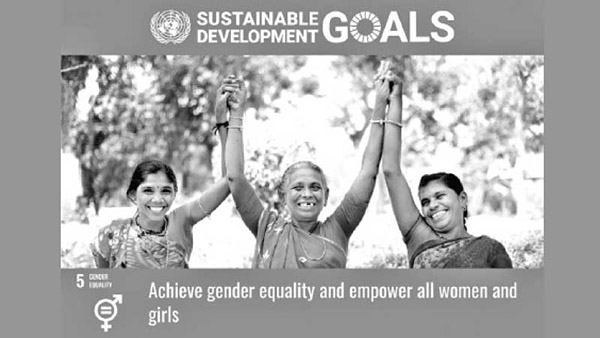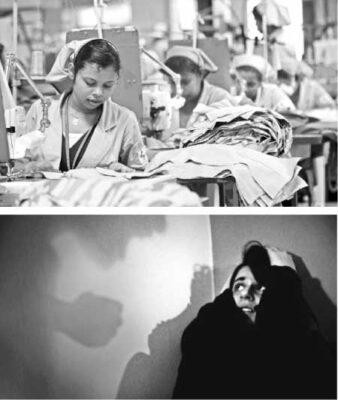The acute need to empower girls and women-by Kanthi Wijetunge

Source:Dailynews
At the dawn of the 21st century, enormous changes have taken place in political, legal, socio-economic, educational and cultural spheres all over the world. Because of urbanization and commercialization which has occurred at an alarming rate people now want to achieve better living standards. Today women face numerous challenges. Amidst all these changes, research today shows that women are the majority who have experienced hunger and poverty in many countries in the world. Similarly, the majority who do not receive primary education are also girls. It is also shown that maternal mortality and infant mortality increased during the last century due to early marriages of girl children. The majority who were affected by HIV/Aids were also found to be women. Achieving gender equality and empowerment of women have been recognized as the most suitable panacea for all these problems.
Thus, the United Nations (UN) has included gender equality and women’s empowerment as the third goal of the Millennium Development Goals (MDGs) introduced in the year 2000. It has been again included in their ‘2030 Agenda’ on Sustainable Development Goals (SDGs) introduced in 2015. It has been emphasized that achieving gender equality is crucial for ending poverty and giving people better health care and education.
Sri Lanka is not an exception. Although we have been boasting for years about the remarkable progress achieved in reducing poverty, achieving universal primary education, reducing child mortality and improving maternal health, compared to other countries in the region, our track record for women’s rights and well-being is not satisfactory. Today we hear many stories where women and girls have been deprived in many ways due to gender inequalities in society. Poverty and other reasons have further aggravated the situation making women more vulnerable in the present context.
Although women represent more than half of the country’s population and their contributions to national income are significant, they are still treated as second-class citizens. Despite the fact that the majority of foreign exchange earners are women domestic workers in Middle Eastern countries, only little has been done to ensure their safety and wellbeing. We still hear stories about the tragedies faced by these women workers. Similarly, many women silently suffer from gender-based discriminations, sexual harassment and violence. Also there is a large percentage of women who have become widows with children without any support for their livelihoods. The low labour force participation of women indicates that the majority of women do not enjoy economic independence.
Labour force participation
Although currently many women join the labor force, women’s labor force participation has remained at a low rate between 30 and 35 percent in the past two decades. When considering the higher educational achievements of women and other social indicators, this is surprising. The percentage of females who enter into higher education during the recent past was much higher than that of males. In 2016/2017, the percentage of girls who entered universities was 60.9 percent while it was 39.1 percent for boys. However, representation of girls in the fields of engineering, technology, architecture, transport and logistics was very low compared to that of boys. Girls are more likely participating in subject areas such as arts, commerce, management, law, medicine and health care. It seems that girls are still choosing the areas which are traditionally considered as suitable for women.
In addition, working mothers face various difficulties due to unbalanced domestic responsibilities, lack of childcare facilities, and sexual harassment at the workplace and in society. They face sexual harassment when it comes to public transport and while travelling. They also face problems in the workplace due to gender-based attitudes. Women’s performance is not adequately recognized and there is a tendency that men are given more preference when it comes to promotions. Above all motherhood is considered as a barrier and it also affects their career mobility.
Vulnerability of women in poverty
Poverty has severely affected the socio-economic status of women in Sri Lanka. It has affected every field such as education, health and nutrition, employment and overall wellbeing.

According to the joint report published by the Government of Sri Lanka and the United Nations, on the achievement of MDGs, Sri Lanka achieved the first goal of MDGs which is halving poverty, seven years before the 2015 deadline. This evaluation report says that 38 percent of national income is shared by the richest population while 1.5 percent of national income is shared by the poorest population. This shows inequality in income distribution. When families are poverty stricken, women and children are the most vulnerable. It mostly affects their nutrition. Malnutrition of children is still highly prevalent in rural areas in Sri Lanka due to lack of family income.
Women and girl children living in some rural areas in Sri Lanka suffer from poverty in many ways. There are villages in Sri Lanka without even basic infrastructure facilities. In most households there are no secure rooms and proper sanitary facilities. Young girls face severe hardships due to this. Pregnant mothers living in these areas have to travel long distances along very difficult roads to find health clinics. Schoolchildren have to travel long distances to reach their schools. They do not have buses or school vans. This situation badly affects the education of girls. They often drop out of school. Early marriages and unplanned pregnancies prevent them from finishing their education.
When mothers go out to earn, the elder girl is left at home to take care of the younger ones and she is supposed to attend to all household work. The situation has become worse in families where mothers have gone for foreign employment. The sole responsibility of the household including the care of her siblings is assigned to the older girl who should be in school. These girls face various forms of sexual harassments in the absence of the mother or another elderly woman. Sometimes their fathers become alcoholics or drug addicts. These young girls are subjected to rape and abuse even by their own fathers or any other men who visit the house. This has directly affected the education of these girl children. Although education is compulsory for all children in Sri Lanka without any gender discrimination, some girls are not able to reap the benefits due to their circumstances.
Teenage pregnancies
Sexual harassment, rape, incest and child abuse have been identified as major reasons for teenage pregnancies. Recently, a newspaper had reported that a 15-year school girl had become pregnant as a result of a love affair with a 20-year-old youth. She was raped by this person. By the time her mother found out, she was already seven months pregnant. This is a pathetic situation. It seems the girl was totally unaware of her reproductive health rights and had engaged in unsafe sexual relations with her boyfriend without knowing the repercussions.
The Family Health Bureau has revealed that 20,000 girls below the age of 18 get pregnant annually. Because of teenage pregnancies, the rate of illegal and dangerous abortions has increased.
Also, it has resulted in malnutrition, increase of infant and maternal mortality as well as increase of sexually transmitted diseases. In addition, these teenage pregnancies destroy the educational prospects of these girl children forcing them to enter into prostitution and drug abuse.
This is a terrible societal problem. Incidents of violence against women have also increased due to this situation. Research has shown that lack of awareness on reproductive health has led to this predicament.
Violence Against Women
One serious issue is Violence Against Women (VAW). At present VAW has become a complex problem. According to the report released by the Department of Census and Statistics (DCS) based on a survey carried out in 25 districts in Sri Lanka with the participation of 2,264 women aged 15 years and older, VAW has been identified as the most pervasive human rights violation in Sri Lanka that impacts the wellbeing of women and girls in Sri Lanka. The report reveals that one in four women in Sri Lanka has experienced physical and sexual violence by a partner or non-partner. Meanwhile, two in every five women have suffered physical, sexual emotional, and/or economic violence. There are instances where many women have been prohibited by their partners to go to work after their marriage.
Recently, I went through an appeal submitted by a woman to the Public Service Commission in the Western Province. She was a healthcare worker who has been issued a vacation of post notice by her employer for not reporting to work without any notice. She stated that her husband prevented her from going to work and the husband did not even hand over the vacation of post notice sent to her by her employer. She has submitted an appeal requesting a reinstatement. By that time her husband had gone to live with another woman. Despite the fact that in Sri Lanka motherhood is revered, findings of this report indicate that the home is not a safe place for a large number of women in Sri Lanka. Although many attempts have been taken by governmental and nongovernmental organizations to curtail VAW in Sri Lankan society, it has become difficult due to social attitudes and perceptions. Unfortunately, many do not perceive VAW to be a human rights violation issue. Girls and women are taught from a very young age that men are superior to them and the role of a good wife is to be subservient to her husband. Because of that wife battery is considered as acceptable. Hence, most domestic violence cases are not reported and women are forced to suffer in silence.
The COVID-19 pandemic has made the situation worse. According to social media, since the COVID-19 lockdown in Sri Lanka starting in March last year, the cases of domestic violence have increased. The complaint Centre established by National Committee on Women has reported that 3,427 cases had been reported islandwide via 1938, the toll-free help line, devoted to VAW cases.
Although various measures have been taken, Sri Lanka’s law and existing systems have failed to protect and safeguard women from violence. Evidence shows that this issue is getting worse day by day. Lack of safe homes and inadequate legal and medical help for victimized women are major problems in Sri Lanka. Women are unable to leave their homes and are forced to coexist with their abusers. It is time we focused attention on these issues and strengthen law enforcement mechanisms. These perpetrators must be brought to justice and women need to be empowered. They must be informed of their rights so they may lead lives free of violence. I would like to end with this quote:
“Teach your daughter
economic independence
So that in the future
She can have a partner, not
a master.
Teach your son
To do housework
So that in the future
He can have a partner, not
a servant.”
(Kanthi Wijetunge is a senior member of the Sri Lanka Administrative Service and has held senior positions in various Government ministries. She was the former Secretary to the Ministry of National Heritage. Currently, she is a member of the National Committee on Women and also a member of the Public Services Commission (WP). Wijetunge held the position of the Director, Women’s Bureau of the Ministry of Women’s Affairs for four years. She has published 10 books and has written articles on various issues including aspects related to women.)








